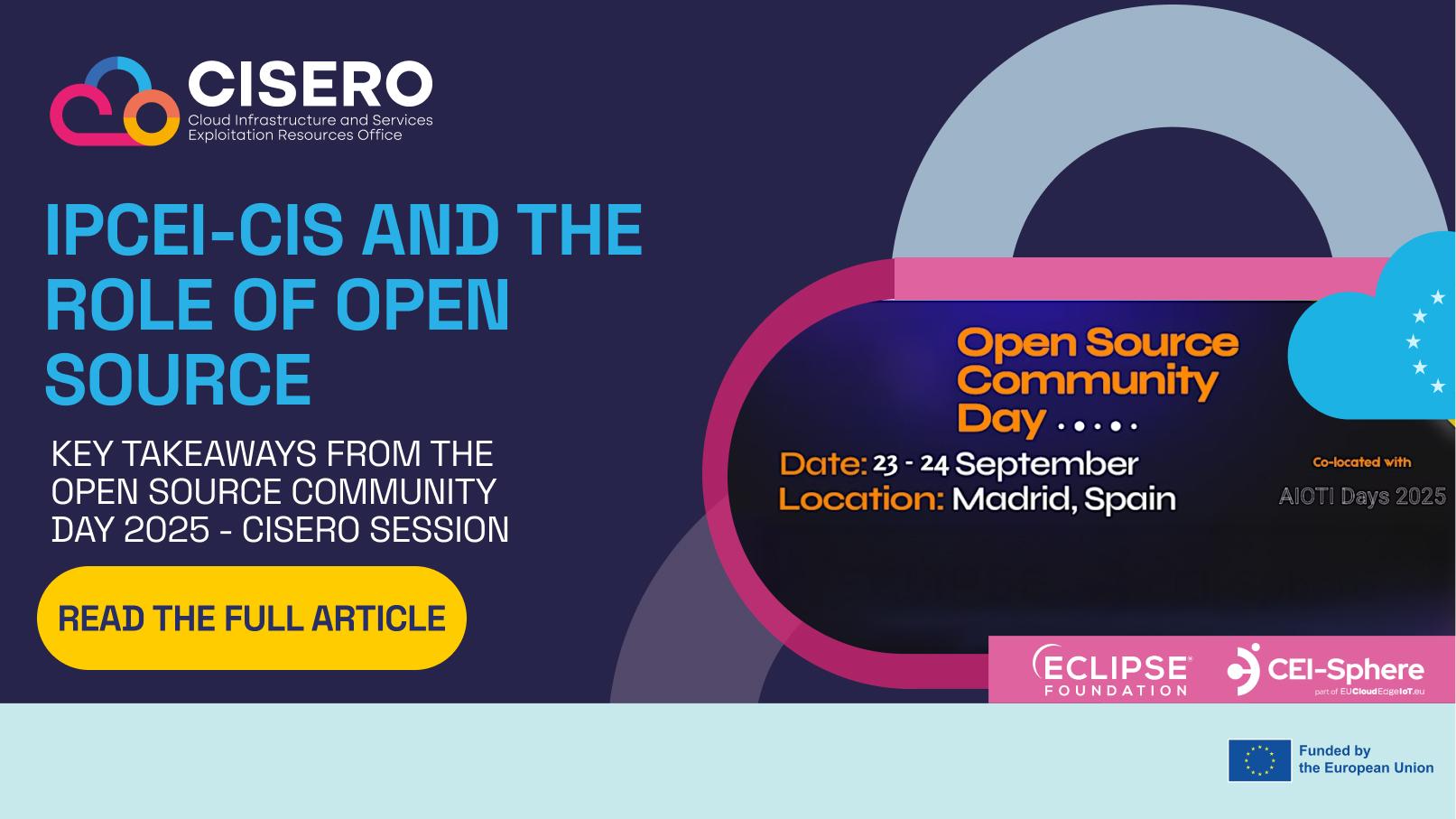CISERO Showcases the role of Open Source in the IPCEI-CIS Ecosystem
20, October, 2025

Workshop at the Open Source Community Event – Co-located with AIOTI Days, 23–24 September 2025
At the heart of Europe’s growing open-source movement, CISERO joined the Open Source Community Event (co-organised by the Eclipse Foundation and the CEI-Sphere project and co-located with the AIOTI Days) to host a dedicated workshop titled “IPCEI-CIS and the Role of Open Source.” Held on 23 September 2025, the session brought together representatives from industry and research to explore how open collaboration can strengthen Europe’s strategic industrial base and advance its vision for a sovereign digital future.
Moderated by Golboo Pourabdollahian (IDC), CISERO Partner, the discussion featured Axel Stahlhut (Amadeus) and Alfonso Carrillo-Aspiazu (OpenNebula Systems), three voices deeply involved in Europe’s evolving cloud and software ecosystems. Together, they offered practical insights into how the IPCEI-CIS initiative is leveraging open source not only as a technical tool but as a cultural shift: one that fosters innovation, interoperability, and shared ownership across borders and sectors.
Open Source as a Strategic Enabler
Open source has become a strategic driver rather than an alternative for many European industries. Large companies increasingly operate at a scale where commercial products rarely meet all their specific needs. Building on open-source technologies allows them to fill functional gaps, co-develop new capabilities, and accelerate delivery, all while avoiding dependency on single vendors. This approach is gaining importance as Europe develops its own sovereign cloud infrastructures, designed to keep data secure, interoperable, and aligned with European values.
The session also underlined that open source transforms how organisations collaborate. Instead of developing everything internally, teams can contribute to shared solutions, exchange expertise, and benefit from collective learning. This evolution requires a cultural and organisational shift, from being mere consumers of open technologies to becoming active contributors. Establishing internal governance frameworks that address intellectual property, legal, and security considerations is essential for sustainable and responsible participation in open ecosystems.
Ensuring Sustainability and Balance
The discussion further emphasised that sustainability is fundamental to the long-term success of open source. Healthy open-source communities are active, diverse, and well-supported. Organisations are learning to assess the resilience of the projects they depend on, considering factors such as contributor activity, responsiveness, and the availability of long-term commercial or community support.
Participants also reflected on the need to balance openness with competitiveness. Many companies choose to share technologies that are foundational (such as infrastructure or tools that others can build upon) while keeping their proprietary business logic internal. This balance allows collaboration on essential components without compromising market differentiation. Open source, in this sense, is not cost-free; it requires investment, coordination, and governance. Yet the return is clear: faster innovation, increased trust, and stronger talent attraction.
Interoperability and the European Digital Space
Interoperability emerged as a recurrent theme throughout the session. Participants highlighted the need for shared reference architectures and reusable blueprints to avoid fragmentation and duplication of effort. Common digital standards and open interfaces enable systems developed in different contexts to interact seamlessly, a prerequisite for the federated, cross-border data and cloud ecosystems envisaged in the European Data Strategy.
This vision resonates with the European Commission’s Open Source Software Strategy and the ambitions of the Digital Europe Programme, which positions openness and interoperability as fundamental enablers of digital sovereignty. Open source, in this perspective, is not merely a technical framework but a policy instrument for ensuring transparency, accountability, and reusability in Europe’s digital infrastructure.
Legal and intellectual-property concerns remain a consideration, especially when determining whether to patent or openly share innovations. However, as organisations gain experience, the benefits of openness increasingly outweigh initial caution. Established governance mechanisms are helping companies participate in open-source ecosystems with greater confidence and clarity.
Looking Ahead
The session concluded with a shared outlook: Europe must accelerate the transition from pilot projects to production-ready sovereign cloud and data infrastructures, ensuring alignment with forthcoming initiatives such as IPCEI-AI. Open-source frameworks and reference models will be crucial to achieve interoperability across sectors, promote trust, and safeguard European autonomy in the global digital arena.
For CISERO, the workshop reaffirmed its role in supporting the IPCEI-CIS community to capitalise on its results through open collaboration and knowledge exchange. By promoting interoperability, sharing good practices, and connecting industrial actors with research and policy stakeholders, CISERO ensures that the outcomes of IPCEI-CIS contribute tangibly to Europe’s broader digital ecosystem.